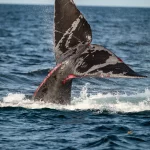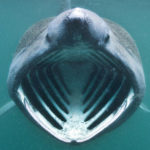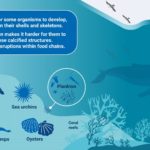Ocean Acidification: An all around bad time
June 21, 2023
By: Madison Malloy
Ocean acidification is the process of the ocean becoming more acidic (as the name implies), and is caused by an increase in CO2 (carbon dioxide) in the atmosphere and ocean. CO2 concentration has been on the rise in the atmosphere for the past 200 years as we progressively began to emit more greenhouse gases (National Oceanic and Atmospheric Administration [NOAA], 2012). A large increase in CO2 in the atmosphere can not only have a warming effect in the atmosphere, but in turn can also allow more carbon dioxide to be absorbed into the ocean. It is estimated that around one-third of the CO2 produced in the atmosphere is absorbed by the ocean (IAEA 2022). When too much is absorbed, it can have adverse impacts on organisms, as well as on how the ocean functions as a whole.
Many organisms rely on calcium carbonate to build their shells (IAEA, 2022)
When CO2 is absorbed, a series of reactions take place that result in fewer carbonate ions in the ocean. Carbonate ions are pretty cool to have around, as they help to make up protective parts of many important organisms in the ocean, including shellfish, coral, and Echinoderms. When there is more CO2 is being absorbed and less carbonate in the ocean, the calcifiers (organisms that use calcium carbonate to build parts of their bodies) have less stuff available to use. This can be harmful to them, the ocean, and people, as they play a vital role in ecosystems and the livelihoods of coastal communities.
Fishing boats on the Bay of Fundy (Saltscapes Magazine, n.d.)
Ocean acidification can have a large impact on people that rely on the ocean. It has been estimated that 3 billion people worldwide have livelihoods that depend on the ocean, and we must also take into account the cultural traditions that have depended on the ocean for generations (IAEA, 2022).
Sea stars on the sea floor (Journal of Young Investigators, 2017)
One group of organisms that may be greatly impacted by ocean acidification are Echinoderms, which include sea stars and sea urchins. Here in St. Andrews, you can find sea stars and sea urchins hanging out at the wharf and in the intertidal zone every day! Sea stars and sea urchins need calcium carbonate to make up various parts, and with less available carbonate in the ocean, they may be more vulnerable to predators, as well as have a harder time feeding and moving (Seattle Aquarium, n.d.). Negative impacts on shellfish can also be observed, with the acidic seawater capable of deteriorating the shells of the young of some species before they can fully form (NOAA, n.d.). This can present challenges for the livelihoods and diets of coastal Indigenous communities that rely on shellfish and other calcifiers as a large portion of their diet (UW News, n.d.)
Purple sea urchins (Jeremy Glass, 2017)
Despite how grim it may seem, there are efforts happening locally and internationally to address the issues of ocean acidification and climate change. As a method to track the changing ocean conditions, Indigenous-led monitoring and management is essential to understanding the impacts on ecosystems and coastal communities (Oceans North, n.d.). Various studies are also underway to explore ways that organisms are adapting, as well as information that can inform policy changes on a larger scale.
A recent study suggests that protecting important habitats like mangroves and seagrass can improve the alkalinity of the surrounding water on a local scale by absorbing more CO2 out of the atmosphere (Nature News, 2023). A different study found that a calcareous sponge, Paraleucilla magna, was able to make its skeleton under very acidic conditions, which may be promising for its ability to adapt should acidification progress (Nature News, 2023). Although these are only a few examples, there are countless studies that have been completed or are underway that aim to learn more about the impacts of this issue. In the face of climate change and ocean acidification, solutions that involve and value the knowledge of coastal communities and Indigenous communities are essential in addition to knowledge derived from scientific research.
References
Fakhraee, M., Planavsky, N. J., & Reinhard, C. T. (2023, May 29). Ocean alkalinity enhancement through restoration of Blue Carbon Ecosystems. Nature News. https://www.nature.com/articles/s41893-023-01128-2
Glass, J. (2019, October 18). Sea urchins are the edible pincushions of the Ocean. HowStuffWorks. https://animals.howstuffworks.com/marine-life/sea-urchin.htm
Hawkins, C. N., & Pain, C. S. (n.d.). Oceans and climate. Oceans North. https://www.oceansnorth.org/en/what-we-do/oceans-and-climate/
IAEA. (2022, December 15). How carbon emissions acidify our ocean. IAEA. https://www.iaea.org/bulletin/how-carbon-emissions-acidify-our-ocean
NOAA. (n.d.) Ocean Acidification’s impact on oysters and other shellfish. https://www.pmel.noaa.gov/co2/story/Ocean+Acidification%27s+impact+on+oysters+and+other+shellfish
Ocean acidification and sea urchins. Seattle Aquarium. (n.d.). https://www.seattleaquarium.org/blog/ocean-acidification-and-sea-urchins#:~:text=Ocean%20acidification%20could%20interfere%20with,and%20crabs%20and%20other%20crustaceans
Officer, C. T. (2017, September 30). Threat of ocean acidification to echinoderms. Journal of Young Investigators. https://www.jyi.org/2010-november/2011/11/28/threat-of-ocean-acidification-to-echinoderms
Partnering with indigenous communities to anticipate and adapt to Ocean Change. UW News. (n.d.). https://www.washington.edu/news/2018/03/21/partnering-with-indigenous-communities-to-anticipate-and-adapt-to-ocean-change/
Ribeiro, B., Lima, C., Pereira, S. E., Peixoto, R., & Klautau, M. (2023, April 25). Calcareous sponges can synthesize their skeleton under short-term ocean acidification. Nature News. https://www.nature.com/articles/s41598-023-33611-3
US Department of Commerce, N. O. and A. A. (2012, August 1). What is ocean acidification?. NOAA’s National Ocean Service. https://oceanservice.noaa.gov/facts/acidification.html
Wallace, J. (n.d.). The unmatched tides of fundy. Saltscapes Magazine. https://www.saltscapes.com/food-travel-guide/stories/2954-the-unmatched-tides-of-fundy.html



